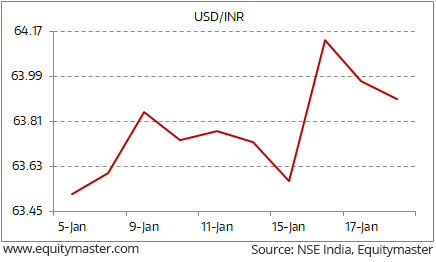- Home
- Todays Market
- Indian Stock Market News January 19, 2018
Indian Indices Trade Marginally Higher; Banking Stocks Witness Buying Interest Fri, 19 Jan 11:30 am
Stock markets in India are presently trading marginally higher. Sectoral indices are trading on a mixed note with stocks in the energy sector and banking sector witnessing maximum buying interest.
The BSE Sensex is trading up 149 points (up 0.4%) and the NSE Nifty is trading up 35 points (up 0.3%). The BSE Mid Cap index is trading up by 0.1%, while the BSE Small Cap index is trading up by 0.3%. The rupee is trading at 63.69 to the US dollar.
In the news from currency markets, the dollar is witnessing selling pressure this week. Most of the losses were seen amid concerns over a US government shutdown.
Dollar Trades on a Negative Note

Owing to the above fall in dollar, the rupee traded on a firm note this week.
Note that the rupee is witnessing appreciation of late. The appreciation in the rupee comes as a welcome breather for importers in India. A softer rupee helps importers to buy goods and services at a cheaper rate that earlier. This is vital for a developing economy that relies heavily on imports. This bodes well for the Indian economy as higher imports normally mean increased economic activity.
But on the other hand, the rise in rupee can spell trouble for exporters. The exporters are at a disadvantage owing to the currency appreciation as this renders their produce expensive in the international markets as compared to other competing nations whose currencies haven't appreciated on a similar scale. This tends to take away a part of the advantage from Indian companies, which they enjoy due to their cost competitiveness.
Nonetheless, a stronger rupee will pull down commodity prices. This will help in keeping a tab on the rising inflation.
While there are advantages as well as disadvantages of a rising rupee, one needs to understand whether the rise in the rupee is sustainable to derive any reasonable conclusion at this stage.
In the news from macroeconomic space, Finance Minister Arun Jaitley said that India will cut rates on some products and services under the new Goods and Services Tax (GST). This will be done in a bid to encourage greater compliance as revenues have dipped since the rollout of the tax regime in July.
The goods on which GST will be lowered include biofuel-run buses, used motor vehicles and diamonds and precious stones.
In the services segment, taxes will be cut on transportation of crude, gasoil, gasoline, jet fuel and services relating to mining, exploration and drilling of oil and natural gas, among other things.
The above relaxation can lead to increased compliance and higher tax revenues. The higher tax revenue receipt will help bolster the country's financials and also provide further ammunition for the government to spend on social welfare and providing additional infrastructure to its citizens.
How this pans out remains to be seen. We will keep you updated on the developments from this space.
After studying these and other finer aspects of GST, our colleague Vivek Kaul, has penned his views on what could go right and wrong. Get a balanced perspective on the entire GST saga from Vivek. The report is titled The Good, the Sad and the Terrible (GST). Claim your own copy of his special report now.
For information on how to pick stocks that have the potential to deliver big returns, download our special report now!
Read the latest Market Commentary


Equitymaster requests your view! Post a comment on "Indian Indices Trade Marginally Higher; Banking Stocks Witness Buying Interest". Click here!
Comments are moderated by Equitymaster, in accordance with the Terms of Use, and may not appear
on this article until they have been reviewed and deemed appropriate for posting.
In the meantime, you may want to share this article with your friends!